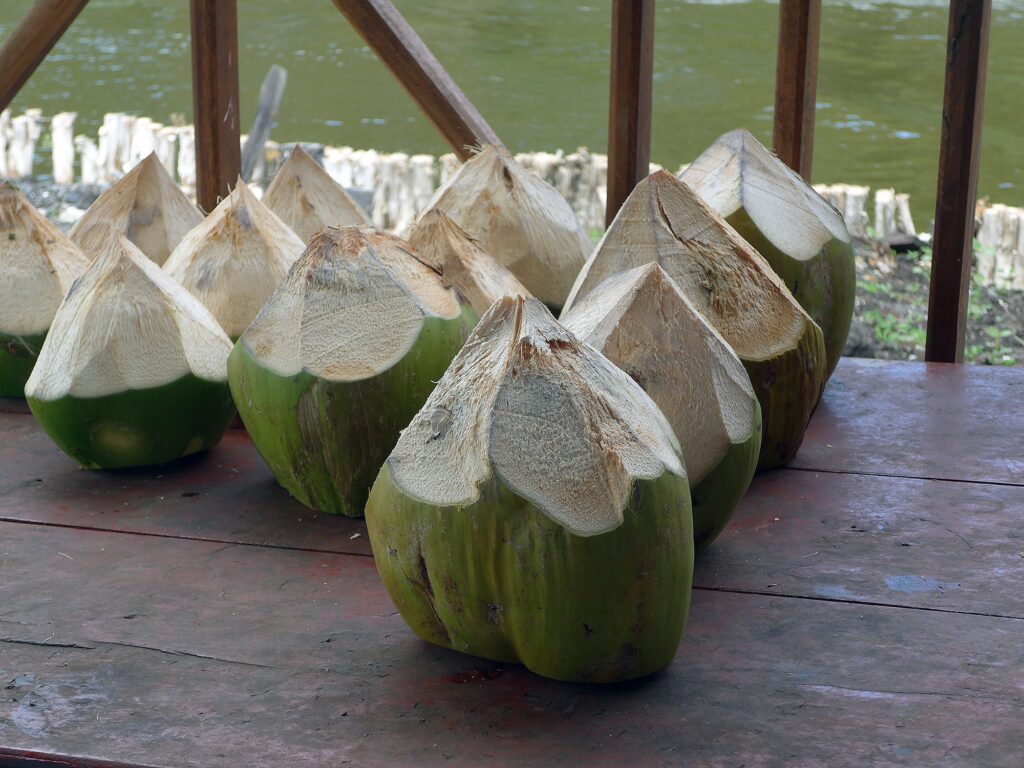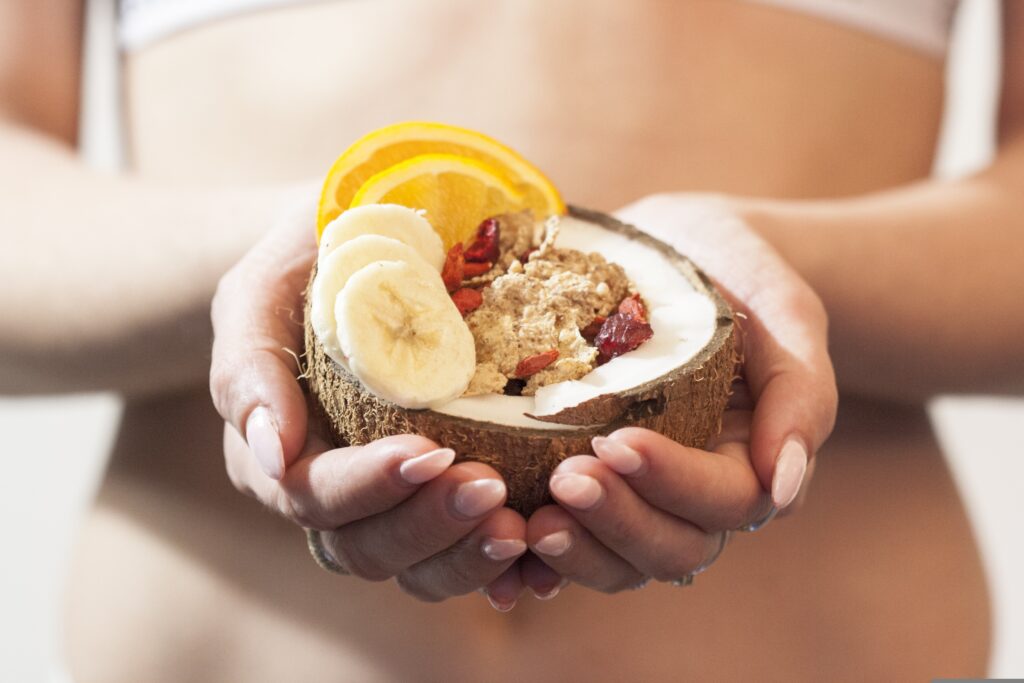Coconut Water May Help With Ulcerative Colitis

A captivating introduction that provides a quick overview of ulcerative colitis and emphasizes the possible advantages of coconut water in symptom management would be a great way to start your blog post. Discuss the chronic inflammatory bowel condition known as ulcerative colitis and the potential benefits of using natural therapies, such as coconut water, in your discussion.
Understanding Ulcerative Colitis:
Ulcerative colitis is an inflammatory bowel disease (IBD) subtype that causes the lining of the colon and rectum to become chronically inflamed and ulcerated. Abdominal pain, diarrhea, rectal bleeding, lethargy, and loss of weight are some of the symptoms that may accompany this illness. Ulcerative colitis usually impacts the colon and rectum, in contrast to Crohn’s disease that can impact any portion of the digestive system.
Although researchers have not pinpointed a single cause for ulcerative colitis, they do believe that it is influenced by immune system elements as well as environmental and genetic variables. Possible contributors to the onset and development of ulcerative colitis include heredity, aberrant immunological response, environmental triggers, and alterations in the gut microbiota.
The inflammation in ulcerative colitis can be mild, moderate, or severe, and it can come and go in flare-ups and remissions. Medication, behavioral changes, and, in extreme circumstances, colon removal surgery are common methods for managing ulcerative colitis.
Living with ulcerative colitis isn’t easy because the symptoms can ruin your day-to-day and overall quality of life. Nonetheless, numerous people who suffer from ulcerative colitis can live satisfying lives after receiving the right treatment and assistance.
Each patient with ulcerative colitis should collaborate closely with their medical team to create a unique treatment strategy that will help them achieve their health objectives. therapy options may involve anti-inflammatory drugs, symptom-controlling dietary adjustments, stress management strategies, and frequent monitoring of disease activity and therapy efficacy.
People with ulcerative colitis can take charge of their health and make positive changes when they learn about the disease and how it affects the body.
What is Coconut Water?

The young, green coconuts contain a transparent, slightly sweet liquid called coconut water. Coconut water has been increasingly popular due to its refreshing flavor and some claims that it may have health advantages. Coconut milk is made from fully ripe coconuts, while coconut water is made from the inside part of immature green coconuts.
Coconut water is a great way to stay hydrated since it contains a lot of electrolytes. Electrolytes include potassium, sodium, and magnesium. Many sports and fitness enthusiasts choose coconut water because of its reputation for rehydrating the body, which is especially important in hot weather or during activity.
Coconut water is a good source of electrolytes, vitamins (especially C and B vitamins), minerals (calcium and phosphorus), and more. The immune system, bone density, and energy metabolism are just a few of the many vital biological activities that these nutrients help to sustain and promote.
Coconut water has fewer calories and less sugar than many other drinks, which makes it a better choice than sugary sodas and sports drinks. People on low-fat or cholesterol-free diets may enjoy it because it contains no added fat or cholesterol.
In general, coconut water has many possible health advantages in addition to being tasty and refreshing. Coconut water is an all-natural beverage that may be drunk straight up or added to other dishes for a nutritional boost; it helps with hydration and replenishes nutrients.
Nutritional Content:
Coconut water has several health benefits beyond simply relieving your thirst. It is rich in nutrients that support a balanced body and mind. The following is an inventory of the many nutrients found in coconut water:
- Electrolytes: Coconut water is well-known for having a high concentration of electrolytes, including magnesium, potassium, and sodium. Essential for appropriate hydration, fluid balance regulation, and muscular function, these electrolytes are everywhere in the body. Sodium has negative impacts on blood pressure regulation and cardiovascular health, although potassium helps offset these effects.
- Vitamins: Vitamin C is just one of many vitamins found in coconut water. Other B vitamins include niacin, pantothenic acid, folate, and riboflavin (B9). Because of its antioxidant properties, vitamin C aids in the neutralization of free radicals and provides immune system support. Energy metabolism, healthy red blood cell synthesis, and a strong neurological system all depend on B vitamins.
- Minerals: Coconut water has potassium, but it also has calcium and phosphorus, two nutrients that are crucial for strong bones. Strong bones and teeth need calcium, and phosphorus helps make energy, synthesizes DNA, and repairs cells.
- Low Calorie and Low Sugar: The lack of calories and sugar in coconut water is one of its distinguishing characteristics. Coconut water provides hydration without the additional sugars and empty calories found in many commercial sports beverages and sodas. Because of this, it is a good choice for people who are trying to control their blood sugar levels or keep a healthy weight.
- Fat-Free and Cholesterol-Free: Because it contains no added sugar or cholesterol, coconut water is great for your heart. Coconut water is a great replacement for sugary and fatty drinks for anyone trying to cut back on fat or lower their cholesterol levels.
Coconut water is a healthy and adaptable beverage choice due to its balanced nutritional profile. Coconut water has many health benefits, including hydration, electrolyte balance, and general wellness. It can be drunk straight from the container or used as a smoothie basis.
Anti-inflammatory Properties:
Coconut water may help those with inflammatory disorders like ulcerative colitis, according to new research. It may also have anti-inflammatory qualities. More research is required to determine the exact mechanism(s) by which coconut water reduces inflammation, but various theories have been advanced:
- Cytokine Modulation: The antioxidants and cytokinins included in coconut water have the potential to reduce inflammation in the body. The anti-inflammatory and antioxidant characteristics of phytohormones called cytokinins suggest they may be useful in alleviating oxidative stress and inflammation.
- Gut Health Support: Reducing inflammation in disorders like ulcerative colitis requires a gut microbiota that is in good balance. Because of its electrolyte content and possible prebiotic effects, coconut water may help maintain a balanced microbiome in the digestive tract by encouraging the expansion of good bacteria and decreasing inflammatory markers.
- Oxidative Stress Reduction: An increase in oxidative stress is a common symptom of chronic inflammation, which in turn can worsen tissue damage and inflammation. Coconut water contains antioxidants like vitamin C and cytokinins, which may help lower inflammation by reducing oxidative stress and free radicals.
- Hydration and Fluid Balance: People suffering from ulcerative colitis are more likely to experience flare-ups and worse inflammation if they do not drink enough water. Hydration and adequate fluid balance can be supported by the electrolyte composition of coconut water, especially its high potassium concentration. Inflammatory episodes caused by dehydration may be reduced if people drink enough of water.
While preliminary evidence suggests that coconut water may have anti-inflammatory properties, it is important to remember that people may react differently and that additional studies are required to demonstrate its efficacy in treating illnesses such as ulcerative colitis. Furthermore, you shouldn’t rely on coconut water in place of medically indicated medications or therapies. Coconut water, when added to a healthy diet, may provide extra help in reducing inflammation and improving health in general.
Potential Risks and Considerations:
Please be aware that there are certain things to think about before drinking coconut water, such as the possibility of allergic reactions or drug interactions. Before making any major adjustments to their diet, readers should talk to a doctor.
Table of Contents
Incorporating Coconut Water into Your Diet:

Coconut water is a versatile and easy addition to any diet. Coconut water is delicious either mixed into other dishes for a tropical flavor or consumed directly from the coconut for a revitalizing drink. For a healthy and refreshing treat, try making a smoothie or shake with coconut water as the basis and adding your favorite fruits and veggies. Soups, stews, and sauces can all benefit from adding coconut water as a liquid because of its electrolyte-rich benefits and slight sweetness.
Another great way to add coconut water to drinks is to freeze it into cubes and then add them to iced tea or cocktails. Coconut water is a tasty and nutritious way to stay hydrated and get more of the nutrients your body needs, plus it’s low in calories and sugar, too.
Conclusion:
Review the main ideas presented in the article, restating how coconut water may help those suffering from ulcerative colitis. It is important to speak with healthcare professionals for individualized guidance, but readers can also think about incorporating coconut water into their diet as a comprehensive way to manage their disease.

